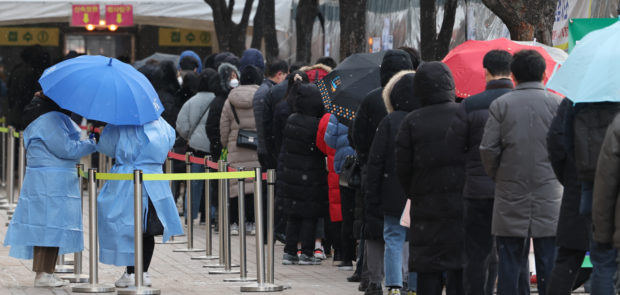S. Korea’s daily COVID-19 cases hit grim milestone of 90,000 amid Omicron woes

People wait in line to receive tests at a COVID-19 testing station in Seoul on Tuesday. (Yonhap via The Korea Herald/Asia News Network)
SEOUL — South Korea’s daily COVID-19 cases spiked to an all-time high Wednesday amid worries that the number could further increase as the government might ease current tough social distancing curbs later this week.
The country reported 90,443 new COVID-19 infections, including 90,281 local cases, raising the total caseload to 1,552,851, according to the Korea Disease Control and Prevention Agency (KDCA).
The latest figure is sharply up from the previous day when new daily cases hit a record high of 57,164.
The death toll from COVID-19 came to 7,202, up 39 from Tuesday.
The fatality rate was 0.46 percent, the KDCA said.
Article continues after this advertisementThe KDCA said the number of critically ill COVID-19 patients was 313, down one from a day earlier. The daily tally stayed above 300 for the third straight day.
Article continues after this advertisementEarlier in the day, Prime Minister Kim Boo-kyum said the number of infections has not reached a peak yet and the government will come up with measures in consideration of both pandemic-hit small businesses and the spread of the virus when it decides Friday whether to adjust current social distancing rules.
Currently, the cap on private gatherings is six people, and a 9 p.m. curfew is imposed on restaurants and cafes nationwide. The prime minister earlier hinted at easing distancing curbs in a way that can help pandemic-hit small businesses but not cause further spread of the virus.
The number of infections has spiked in recent weeks due to the fast spread of the more transmissible omicron variant. The number topped 40,000 for the first time on Feb. 9, and only a day later, it exceeded the 50,000 level and has stayed over the mark until Tuesday.
Of the locally transmitted cases, Gyeonggi Province that surrounds Seoul reported 27,954, followed by Seoul with 18,834 and the southeastern port city of Busan with 6,483, the KDCA said.
Cases from overseas went up 162 to 27,659.
As of Wednesday, 29.77 million people, or 58 percent of the country’s 52 million population, had received booster shots. The number of fully vaccinated people came to 44.25 million, accounting for 86.2 percent.
Health authorities have warned that daily new cases could hit 170,000 by around the end of this month. The National Institute of Mathematical Sciences, a state-run think tank, estimated the figure could even soar as high as 360,000 by early next month. (Yonhap)
RELATED STORIES
S. Korea’s new COVID-19 cases over 50,000 for 5th day amid worries over further spike
New COVID-19 cases in S. Korea hit record high of over 56,000 amid Omicron surge
S. Korea’s new COVID-19 cases soar to all-time high of over 50,000 amid raging Omicron
S. Korea turns to self treatment as Omicron fuels soaring COVID-19 cases
South Korea extends social distancing rules as Omicron cases spike
For more news about the novel coronavirus click here.
What you need to know about Coronavirus.
For more information on COVID-19, call the DOH Hotline: (02) 86517800 local 1149/1150.
The Inquirer Foundation supports our healthcare frontliners and is still accepting cash donations to be deposited at Banco de Oro (BDO) current account #007960018860 or donate through PayMaya using this link.